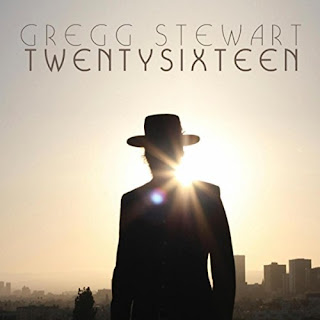OFFICIAL: http://greggstewartmusic.com/
TWITTER: https://twitter.com/gstewartmusic
INSTAGRAM: instagram.com/thatgreggstewart
Written
by Raymond Burris, posted by blog admin
Fourteen
songs for Gregg Stewart’s album Twenty Sixteen gives listeners an idea about
how much devastation death visited on the music community in 2016. There is
certainly a passing of the guard going on today as the icons of the sixties and
seventies succumb to countless ailments and leave the scene. We are fortunate
to have performers and writers like Gregg Stewart emerging to take their place.
He gives an overview of what he loves plus a creative tribute wrapped up in one
and puts some real flair on it thanks to a multi-faceted vocal performance that
inhabits all of the tunes and just the right amount of artful accompaniment from
a three piece backing band. Despite the tasteful quality of these tracks,
however, there’s real grit and gravitas to be heard by attentive listeners.
Twenty Sixteen will please fans of the respective artists, Gregg Stewart fans,
and undoubtedly win new converts over with their presentation.
The
key performances on Twenty Sixteen, satisfying on both a vocal and musical
level, are his adaptation of Prince’s “Raspberry Beret”, his bluesy remake of
Leon Russell’s “One More Love Song”, “If I Could Only Fly”, “High Flying Bird”,
Guy Clark’s “Out in the Parking Lot”, the great Leonard Cohen’s “Leaving the
Table”, and David Bowie’s “Starman”. The lightly dancing keyboard notes
carrying the memory of “Raspberry Beret” have a sparkling delicacy that keeps
the song wafting just off the ground and moving past listeners. Stewart’s album
notes discuss how he hoped to turn Leon Russell’s classic “One More Love Song”
into something reminiscent of The Band’s recordings from their first two albums
and manages it with magically minimal effort. The countrified leanings that
Stewart excels so well with reach a full flower with the track “If I Could Only
Fly”, written by Blaze Foley, popularized by Merle Haggard. The tender, careful
vocal treatment that he gives to Foley’s lyrics is quite reminiscent of Haggard’s
own version. It keeps a rootsy air going
from beginning to end.


No comments:
Post a Comment